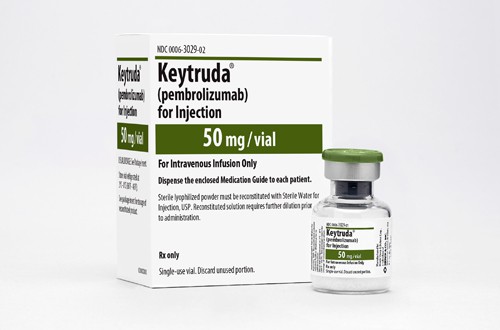
Merck & Co/MSD’s blockbuster immunotherapy Keytruda extended the lives of a small subset of advanced-stage prostate cancer patients, according to the results from its phase 2 KEYNOTE-199 study.
According to these results, 5% of men who had metastatic castration-resistant prostate cancer (mCRPC) treated with Keytruda (pembrolizumab) saw their tumours shrink or disappear, while a larger number – 19% – demonstrated some evidence of tumour response with a decrease in prostate-specific antigen (PSA) levels.
The average length of survival in the group of 166 patients with advanced prostate cancer and high levels of PSA was 8.1 months when treated with Keytruda.
Out of this group, nine patients saw their disease disappear or partly disappear on scans, and of this small subset there were ‘super-responders’ who were still on treatment with Keytruda at the end of study follow-up, whose responses lasted for at least 22 months.
These ‘super-responders’ had tumours with mutations in genes involved in reparing DNA – the study investigators are researching to see whether this group might particularly benefit from treatment with immunotherapy.
Another group of patients whose PSA levels were lower but whose cancer had spread to the bone lived for an average of 14.1 months on Keytruda.
“Our study has shown that a small proportion of men with very advanced prostate cancer are super responders to immunotherapy and could live for at least two years and possibly considerably longer,” said Johann de Bono, Regius Professor of Cancer Research at the Institute of Cancer Research, London and consultant medical oncologist at The Royal Marsden NHS Foundation Trust.
“We don’t see much activity from the immune system in prostate tumours, so many oncologists thought immunotherapy wouldn’t work for this cancer type,
But our study shows that a small proportion of men with end-stage cancer do respond, and crucially that some of these men do very well indeed,” he added.
Prostate cancer is the most common cancer in men and has a higher incidence than lung cancer, which to date has driven Keytruda’s growth. While lung cancer is in decline in developed markets as smoking levels decrease, occurrences of prostate cancer are increasing.
Merck has competition in the area however, with rival from Bristol-Myers Squibb garnering positive results with its double immunotherapy combination PD-1 inhibitor Opdivo (nivolumab) and CTLA4 inhibitor Yervoy (ipilimumab) in castration-resistant prostate cancer.




